Title explains a small part so let me explain 2 scenarios. Scenario 1 is raising errors, scenario 2 works like a charm.
Scenario 1:
I checkout a document with the method below, when the document is saved to a location where already is a file with that name it gets overwritten, But surprisingly it also locks the file for some reason:
public bool SaveDocument(int bestandsId, string fileName, string path)
{
//Initialize the Sql Query
var sql = "SELECT DATA FROM Documenten WHERE BESTAND_ID = " + bestandsId;
//Initialize SqlConnection
var connection = new SqlConnection(Instellingen.Instance.DmsConnectionString);
//Initialize SqlCommand
var command = new SqlCommand(sql, connection);
try
{
//Open Connection
connection.Open();
//Fill 'data' from command.ExecuteScalar()
var data = (byte[]) command.ExecuteScalar();
//Write 'data' to file.
File.WriteAllBytes(path + @"\" + fileName, data);
//Return true if no exceptions are raised.
return true;
}
catch (Exception ex)
{
//Initialize Dms Exception
var dmsEx = new DmsException(ex);
//Write Dms Exception to Log File.
DmsException.WriteErrorsToLog(dmsEx);
//Return false, because something went wrong...
return false;
}
finally
{
//Close Sql Connection
connection.Close();
}
}
The method runs smoothly. No problems occur. But when I check in the document with the method below, I get this exception:

Scenario 2:
When I use the SaveDocument method to save the document to a location where there isn't a file with the same name, the file is newly created and is ready to be edited or what ever you want to do with it.
Using scenario 2 is working perfect. The document is ready to be checked in again without receiving an error as shown in the picture above.
Request for code by: @CodeCaster
---------------------------------BEGIN EDIT---------------------------------
public static bool InsertDocument(Document document)
{
try
{
//Exception is thrown when Initializing the FileStream
var fileStream = new FileStream(document.Fileinfo.FullName, FileMode.Open, FileAccess.Read);
var binaryReader = new BinaryReader(fileStream);
var totalNumberOfBytes = new FileInfo(document.Fileinfo.FullName).Length;
var data = binaryReader.ReadBytes((Int32) totalNumberOfBytes);
fileStream.Close();
fileStream.Dispose();
binaryReader.Close();
binaryReader.Dispose();
var pdftext = string.Empty;
try
{
if (document.DocumentType == ".pdf")
{
var reader = new PdfReader(document.Fileinfo.FullName);
var text = string.Empty;
for (var page = 1; page <= reader.NumberOfPages; page++)
{
text += PdfTextExtractor.GetTextFromPage(reader, page);
}
reader.Close();
pdftext = text;
}
}
catch (Exception ex)
{
var dmsEx = new DmsException(ex);
DmsException.WriteErrorsToLog(dmsEx);
}
return InsertIntoDatabase(document.BestandsNaam, document.Eigenaar, document.Omschrijving,
document.DatumToevoeg.ToString(), document.DatumIncheck.ToString(),
document.DatumUitcheck.ToString(), document.UitgechecktDoor,
document.DocumentType, data, pdftext, document.Versie, document.Medewerker,
document.DossierNummer, document.PersonalFolderId.ToString(),
document.DossierFolderId, -1, document.DocumentProgres,
document.OriBestandId.ToString(), 0);
}
catch (Exception ex)
{
var dmsEx = new DmsException("Fout bij inlezen voor toevoeging van nieuw document",
"Klasse Document (InsertDocument)", ex);
ExceptionLogger.LogError(dmsEx);
return false;
}
}
---------------------------------END EDIT---------------------------------
My questions:
- What is the cause for the file being locked when it gets overwritten?
- How can I prevent this from happening?
- Is there some sort of function or parameter that I can set so it doesn't get locked?
Using a tool called "Unlocker" I managed to see what program is locking the file, and YES -> DMS.exe is my application.......:
